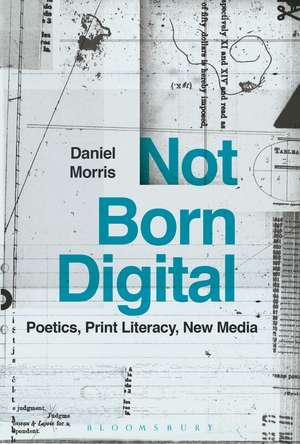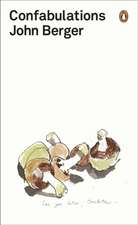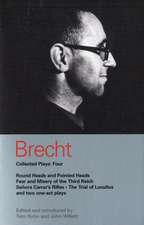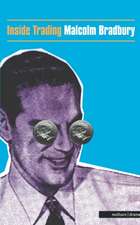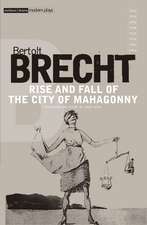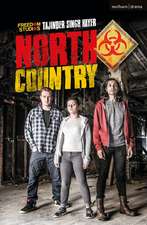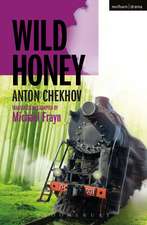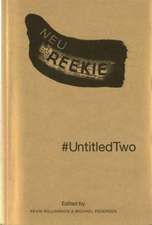Not Born Digital: Poetics, Print Literacy, New Media
Autor Professor Daniel Morrisen Limba Engleză Paperback – 24 ian 2018
| Toate formatele și edițiile | Preț | Express |
|---|---|---|
| Paperback (1) | 237.66 lei 6-8 săpt. | |
| Bloomsbury Publishing – 24 ian 2018 | 237.66 lei 6-8 săpt. | |
| Hardback (1) | 773.88 lei 6-8 săpt. | |
| Bloomsbury Publishing – 13 iul 2016 | 773.88 lei 6-8 săpt. |
Preț: 237.66 lei
Preț vechi: 272.74 lei
-13% Nou
Puncte Express: 356
Preț estimativ în valută:
45.48€ • 47.61$ • 37.63£
45.48€ • 47.61$ • 37.63£
Carte tipărită la comandă
Livrare economică 05-19 aprilie
Preluare comenzi: 021 569.72.76
Specificații
ISBN-13: 9781501339417
ISBN-10: 1501339419
Pagini: 264
Ilustrații: 4 b/w illustrations
Dimensiuni: 152 x 229 mm
Greutate: 0.36 kg
Ediția:NIPPOD
Editura: Bloomsbury Publishing
Colecția Bloomsbury Academic
Locul publicării:New York, United States
ISBN-10: 1501339419
Pagini: 264
Ilustrații: 4 b/w illustrations
Dimensiuni: 152 x 229 mm
Greutate: 0.36 kg
Ediția:NIPPOD
Editura: Bloomsbury Publishing
Colecția Bloomsbury Academic
Locul publicării:New York, United States
Caracteristici
Fresh, in-depth, and original readings of poetry by established and emerging authors whose writings interact with or react against new media
Notă biografică
Daniel Morris is Professor of English at Purdue University, USA. He is author of The Writings of William Carlos Williams: Publicity for the Self (1995), Remarkable Modernisms: Contemporary American Authors on Modern Art (2002), The Poetry of Louise Glück: A Thematic Introduction (2006), After Weegee: Essays on Contemporary Jewish American Photographers (2011), and Lyric Encounters (Bloomsbury, 2013). He has also published two volumes of poetry, Bryce Passage (2004) and If Not for the Courage (2010).
Cuprins
Introduction Not Born Digital: Poetics, Print Literacy, New MediaChapter OneMedium as Messenger: Hannah Weiner Anchors the Social Poetics of 1986 in Weeks Chapter TwoA Blizzard of Snowflakes: Kenneth Goldsmith as Conceptualist at the Cusp of a Digital Age in SoliloquyChapter Three(In)decisive Moments: On Kenneth Goldsmith's Seven American Deaths and Disasters Chapter Four"The wound track shows deeper hemorrhage": Kenneth Goldsmith's "The Body of Michael Brown" as The Eighth American DisasterChapter FiveGaps in the Machine: Andrei Codrescu's Unarchival PoeticsChapter Six"Needing to Summon the Others": Archival Research as Séance in Susan Howe's Spontaneous Particulars Chapter SevenBad Company, Meet Sonic Youth: On Noah Eli Gordon's Inbox: Social Media, Post Language Conceptual Poetics, and the Ethics of Online AppropriationChapter EightA Tonalism, Synaesthesia, Translation, and Post-Ableism in The Route Chapter NineWhat Makes Poetry Happen: The Erotics of Literary Activism in an Age of Internet VirusBibliographyIndex
Recenzii
This is one of the best studies to date of what happens to poetry and the poetic in our 'new media age.' Himself a poet, Daniel Morris understands as have few critics that the real effect of the digital on younger poets is to create an entirely new sense of materiality, of poetry as the archive of experience rather than a finished product. For the poets in question from Hannah Weiner to Juliana Spahr, it's not a matter of writing 'digital poetry' but of making use of the new constraints the digital puts upon us. The chapters on Kenneth Goldsmith's controversial writings are especially strong-and also eminently reasonable and good-humored.
As long as 'old' media persist, writers will worry, contest, play with, theorize, and explore their relationship to 'new' media. From this position, Daniel Morris reads across generations from Weiner and Howe, through Codrescu and Goldsmith, to 'experiments in digital citizenship' by Noah Eli Gordon, Durgin and Hofer, Spahr and Buuck, offering a careful and sometimes controversial poetics of convergence culture as these poets negotiate issues of personal and historical trauma, archiving, memory, witness, authorship, and some sort of human future.
As long as 'old' media persist, writers will worry, contest, play with, theorize, and explore their relationship to 'new' media. From this position, Daniel Morris reads across generations from Weiner and Howe, through Codrescu and Goldsmith, to 'experiments in digital citizenship' by Noah Eli Gordon, Durgin and Hofer, Spahr and Buuck, offering a careful and sometimes controversial poetics of convergence culture as these poets negotiate issues of personal and historical trauma, archiving, memory, witness, authorship, and some sort of human future.
